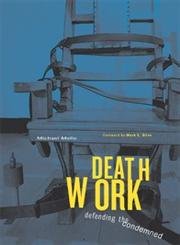deathwork defending condemned von mello michael (7 Ergebnisse)
Suchfilter
Produktart
- Alle Product Types
- Bücher (7)
- Magazine & Zeitschriften (Keine weiteren Ergebnisse entsprechen dieser Verfeinerung)
- Comics (Keine weiteren Ergebnisse entsprechen dieser Verfeinerung)
- Noten (Keine weiteren Ergebnisse entsprechen dieser Verfeinerung)
- Kunst, Grafik & Poster (Keine weiteren Ergebnisse entsprechen dieser Verfeinerung)
- Fotografien (Keine weiteren Ergebnisse entsprechen dieser Verfeinerung)
- Karten (Keine weiteren Ergebnisse entsprechen dieser Verfeinerung)
- Manuskripte & Papierantiquitäten (Keine weiteren Ergebnisse entsprechen dieser Verfeinerung)
Zustand Mehr dazu
- Neu (5)
- Wie Neu, Sehr Gut oder Gut Bis Sehr Gut (Keine weiteren Ergebnisse entsprechen dieser Verfeinerung)
- Gut oder Befriedigend (2)
- Ausreichend oder Schlecht (Keine weiteren Ergebnisse entsprechen dieser Verfeinerung)
- Wie beschrieben (Keine weiteren Ergebnisse entsprechen dieser Verfeinerung)
Einband
Weitere Eigenschaften
- Erstausgabe (Keine weiteren Ergebnisse entsprechen dieser Verfeinerung)
- Signiert (Keine weiteren Ergebnisse entsprechen dieser Verfeinerung)
- Schutzumschlag (Keine weiteren Ergebnisse entsprechen dieser Verfeinerung)
- Angebotsfoto (2)
Sprache (1)
Gratisversand
Land des Verkäufers
Verkäuferbewertung
-
Deathwork: Defending the Condemned
Verlag: University of Minnesota Press, 2002
ISBN 10: 0816640882 ISBN 13: 9780816640881
Sprache: Englisch
Anbieter: ThriftBooks-Dallas, Dallas, TX, USA
Paperback. Zustand: Very Good. No Jacket. May have limited writing in cover pages. Pages are unmarked. ~ ThriftBooks: Read More, Spend Less 3.65.
-
Deathwork: Defending The Condemned
Anbieter: Ria Christie Collections, Uxbridge, Vereinigtes Königreich
EUR 20,35
EUR 13,72 für den Versand von Vereinigtes Königreich nach USAAnzahl: 1 verfügbar
In den WarenkorbZustand: New. In.
-
Deathwork: Defending The Condemned
Verlag: University of Minnesota Press, 2002
ISBN 10: 0816640882 ISBN 13: 9780816640881
Sprache: Englisch
Anbieter: Kennys Bookstore, Olney, MD, USA
Zustand: New. Num Pages: 340 pages, illustrations. BIC Classification: JP. Category: (G) General (US: Trade). Dimension: 228 x 154 x 18. Weight in Grams: 500. . 2002. First Edition. Paperback. . . . . Books ship from the US and Ireland.
-
EUR 35,71
EUR 11,45 für den Versand von Vereinigtes Königreich nach USAAnzahl: 1 verfügbar
In den WarenkorbPaperback. Zustand: Brand New. illustrated edition. 336 pages. 8.75x5.75x0.75 inches. In Stock.
-
Deathwork : Defending the Condemned
Verlag: University of Minnesota Press, 2002
ISBN 10: 0816640874 ISBN 13: 9780816640874
Sprache: Englisch
Anbieter: Better World Books, Mishawaka, IN, USA
Zustand: Good. Former library book; may include library markings. Used book that is in clean, average condition without any missing pages.
-
Kartoniert / Broschiert. Zustand: New. KlappentextrnrnLegal cases are stories, and some of the most compelling -- and the most disturbing -- are those that take place on death row: the innocent man executed, juveniles and the mentally ill condemned to die, a smoking electric chair, a.
-
Deathwork : Defending the Condemned
Verlag: University Of Minnesota Press Nov 2002, 2002
ISBN 10: 0816640882 ISBN 13: 9780816640881
Sprache: Englisch
Anbieter: AHA-BUCH GmbH, Einbeck, Deutschland
Taschenbuch. Zustand: Neu. Neuware - Part memoir, part legal casebook, Deathwork offers a gritty, often anguishing picture of what Supreme Court Justice Harry Blackmun called the American legal 'machinery of death.' The stories Mello tells raise questions about legal issues-from prosecutorial misconduct to the racial inequities of sentencing, from the rules of evidence to the rights of the mentally ill-that here take on a life-and-death urgency. They describe in detail how constitutional issues are raised postconviction, and how those issues are adjudicated by the courts and in accordance with bizarre claims of objectivity. And they show, with a painful immediacy and authenticity, what it is like to live and work under an impending death sentence, the adrenaline rush of the stay or unexpected success, the inconsolable sadness upon the execution of the sick, the afflicted, the innocent.





